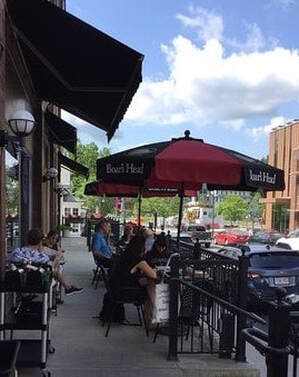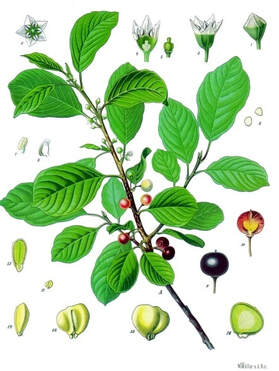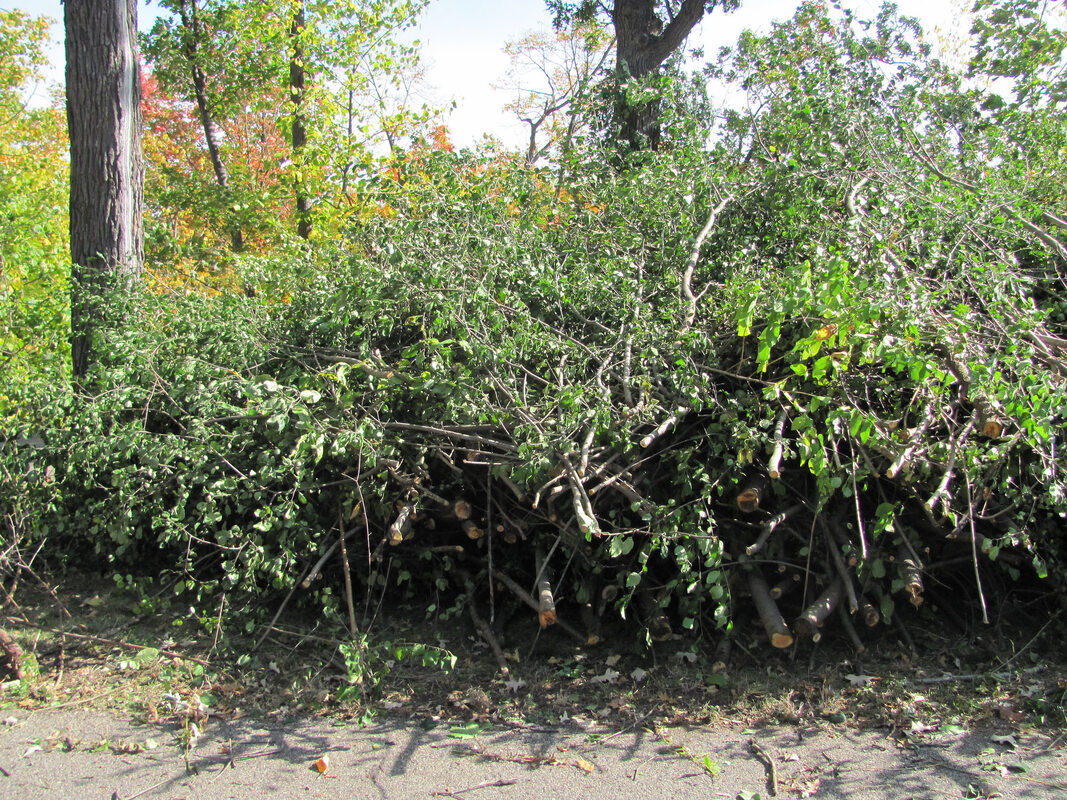 Spring Street Market and Cafe
Spring Street Market and Cafe There we were, at a table outside the Spring Street Market & Café in Williamstown, Massachusetts, enjoying a wonderful lunch on a beautiful Sunday afternoon in May, and this truck hauling a tangled load of uprooted buckthorn pulls alongside us. The engine, alas, does not turn off. Just a few feet away, it idles, belching blue-black diesel fumes. Soon the driver's window rolls down and I can't make out the face from my vantage point, but I can see a meaty, tattooed arm protruding from the cab. It holds a cigarette, with almost dainty flair. Once, twice, it taps the ash. Then the arm retracts, the windows rolls up and the loud, noxious idling continues. Altogether it's a big Trump You to the tourists from the big-bad city as well as the entitled kids attending elite Williams College, this town's major employer.
A few more minutes pass. I want to get up and knock on the driver's-side window and ask him to cool it, but I don't because I'm a flatlander/out-of-towner and I've already passed my confrontation limit for the month. Besides, we were almost done eating when the truck showed. The flavor of the fossil-fuel fumes only marred my last savorings of turmeric rice, avocado, poached eggs, black beans, Vermont cheddar and green chile sauce -- the gently melded ingredients making up the sublime Brunch Bowl.
The guy in the idling truck, I bet, harbors a good bit of anger. He's found a clever way to release it on a bunch of pansy-assed, vegan liberals who deserve it because we want to stop him and other patriotic Americans from owning guns, praying without masks, building walls (which make good neighbors) and burning stuff to make the world go around. Plus, he's supposed to feel bad now for grilling animal meat and gnawing on it, like that's destroying the world or something? He's supposed to eat a goddamned Brunch Bowl?! Well, fine, isn't that America today in all its red vs. blue glory. Or gory. What interests me isn't so much the man's unneighborly behavior, but the load of buckthorn that, we'll assume, he'd spent the morning yanking from Mother Earth.
A few more minutes pass. I want to get up and knock on the driver's-side window and ask him to cool it, but I don't because I'm a flatlander/out-of-towner and I've already passed my confrontation limit for the month. Besides, we were almost done eating when the truck showed. The flavor of the fossil-fuel fumes only marred my last savorings of turmeric rice, avocado, poached eggs, black beans, Vermont cheddar and green chile sauce -- the gently melded ingredients making up the sublime Brunch Bowl.
The guy in the idling truck, I bet, harbors a good bit of anger. He's found a clever way to release it on a bunch of pansy-assed, vegan liberals who deserve it because we want to stop him and other patriotic Americans from owning guns, praying without masks, building walls (which make good neighbors) and burning stuff to make the world go around. Plus, he's supposed to feel bad now for grilling animal meat and gnawing on it, like that's destroying the world or something? He's supposed to eat a goddamned Brunch Bowl?! Well, fine, isn't that America today in all its red vs. blue glory. Or gory. What interests me isn't so much the man's unneighborly behavior, but the load of buckthorn that, we'll assume, he'd spent the morning yanking from Mother Earth.
 Rhamnus Frangula
Rhamnus Frangula Buckthorn, in the USA, is considered a non-native invasive species, a degrader of ecosystems. It's often referred to as common or European or glossy buckthorn, of the Rhamnacae family of flowering plants. According to the Friends of the Mississippi River, who regularly organize parties to pluck the buck, this tall understory shrub is "extremely hardy and able to thrive in a variety of soil and light conditions." Indeed, it's apparently evolved to both grow wildly and resist predators, with masses of leaves that hang on through fall and black fruit that makes most animals and birds wretch or get the runs (buckthorn is a mean purgative in herbal medicine). When reduced to stumps, buckthorn will shoot back up, phoenix-like, which is why buckthorn hunters are advised to cover stumps with a black plastic shroud.
Extremely hardy, indeed. In fact, they remind me of a certain stubborn species I've encountered...humans! Hardy humans, expanding madly across the planet. Indeed, perhaps the human species has become the most invasive species on Earth, unnaturally expert at overwhelming biospheres with powerful growth and defensive powers. Buckthorn, however, is invasive by virtue of having been moved by Homo sapiens from its original habitat, where it coexisted in relative balance with the flora and fauna with which it co-evolved. Here it doesn't fit and runs amok. Humans, by contrast, are invasive by virtue of our intellect and opposable thumbs, not necessarily in that order. We run amok everywhere. And so far, plants and animals have displayed no ready response to our vigorous dominion, unless you consider climate change as a total-systems response to our onslaught. It'll take awhile, but we'll cook them out. For more on these theories, see two provocative books: The Revenge of Gaia by James Lovelock (2006) and Defiant Earth by Clive Hamilton (2017).
Extremely hardy, indeed. In fact, they remind me of a certain stubborn species I've encountered...humans! Hardy humans, expanding madly across the planet. Indeed, perhaps the human species has become the most invasive species on Earth, unnaturally expert at overwhelming biospheres with powerful growth and defensive powers. Buckthorn, however, is invasive by virtue of having been moved by Homo sapiens from its original habitat, where it coexisted in relative balance with the flora and fauna with which it co-evolved. Here it doesn't fit and runs amok. Humans, by contrast, are invasive by virtue of our intellect and opposable thumbs, not necessarily in that order. We run amok everywhere. And so far, plants and animals have displayed no ready response to our vigorous dominion, unless you consider climate change as a total-systems response to our onslaught. It'll take awhile, but we'll cook them out. For more on these theories, see two provocative books: The Revenge of Gaia by James Lovelock (2006) and Defiant Earth by Clive Hamilton (2017).
Back to buckthorn in Vermont, as well as other misplaced and therefore invasive plants and animals such as kudzu in Georgia, Asian carp in the Great Lakes and cane toads in Australia. Eradicating these fiends is considered a green-virtuous deed, one that even employs people, such as our idling truck driver, who probably don't belong to the Sierra Club. If you've gone on an invasive species hunt, you know there's something satisfying about ripping the interloper from the soil or knocking the troublemaker on the head. It's a job well done, indeed, and then we all return to our regular occupation of acting a lot worse than the fiend we just slayed.
It's also worth noting that buckthorn can't help but act like buckthorn. It doesn't realize that it's dominating and destroying its unfamiliar surroundings. It can't stop itself. Humans, on the other hand, now have a very good idea of what we're doing to Earth's biospheres and civilizations. We can stop ourselves. But, so far, we won't. We just won't.
It's also worth noting that buckthorn can't help but act like buckthorn. It doesn't realize that it's dominating and destroying its unfamiliar surroundings. It can't stop itself. Humans, on the other hand, now have a very good idea of what we're doing to Earth's biospheres and civilizations. We can stop ourselves. But, so far, we won't. We just won't.

 RSS Feed
RSS Feed